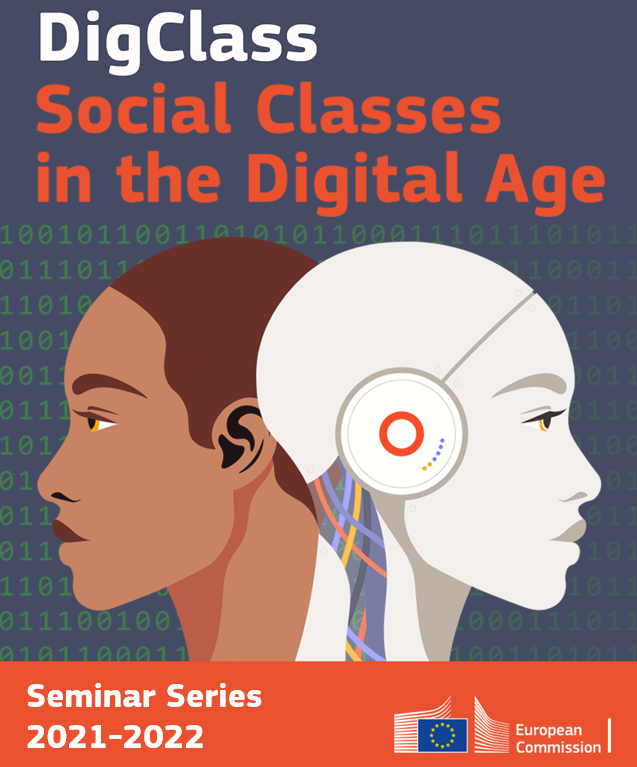- social inequality | distribution of income | socially disadvantaged class | data science | economic model | social analysis
- Tuesday 26 April 2022, 15:00 - 16:00 (CEST)
- Online only
- Live streaming available
Practical information
- When
- Tuesday 26 April 2022, 15:00 - 16:00 (CEST)
- Where
- Online only
- Languages
- English
- Website
- Link to the recorded session
- Social media links
Description

The DIGCLASS seminar series is expected to facilitate the exchange of cutting-edge ideas and debates related to social inequality, labour economics and political economy between JRC researchers and beyond by attracting external scholars, policy-makers and a general audience.
Visit the DIGCLASS website to check the full programme!
Drop us a line at JRC-CAS-DIGCLASS ec [dot] europa [dot] eu (JRC-CAS-DIGCLASS[at]ec[dot]europa[dot]eu) if you want to stay tuned with our seminar series and other activities.
ec [dot] europa [dot] eu (JRC-CAS-DIGCLASS[at]ec[dot]europa[dot]eu) if you want to stay tuned with our seminar series and other activities.
Title
Intergenerational Income Mobility
Abstract
Rising inequalities in rich countries have led to concerns that the economic ladder is getting harder to climb. It is well established that intergenerational income mobility is lower in countries with high inequality, but research on trends in mobility finds conflicting results. Motivated by this uncertainty, we ask: how important are choices of specification for levels and trends in intergenerational income associations? We use Swedish data on cohorts born 1958–1977 and their parents. Varying how, when and for whom income is measured, we estimate 1,658,880 different associations (82,944 specifications across 20 cohorts). Our results reveal that model choice is an underrecognized source of variation in intergenerational mobility research. The most consistent contributor to trends is the advancement of women in the labor market, which leads to increased persistence in women’s earnings and the family income of both men and women. Depending on specification, it is possible to conclude that income mobility is increasing, decreasing, or remaining flat. Despite variability, our results are broadly consistent with the received view that the level of mobility in Sweden is high in a comparative perspective.
Speakers
Carina Mood is a professor at the Swedish Institute for Social Research (SOFI), Stockholm University. Her research interests include poverty, inequality, intergenerational transmission of advantage, and the welfare and well-being of children and youth, and she is part of the Level-of-living team at SOFI. She currently heads the FORTE-funded research program Interlocking inequalities: A multidimensional perspective on inequality in contemporary Sweden (MINQ), the FORTE-funded research project Economic resources and social relations among children and youth, and the NORDFORSK-funded project IntegrateYouth. Carina is also affilated to the Institute for Futures Studies where she coordinates the FORTE-funded research program YOUNG, and heads the related project YOUNGWORK about early labour market outcomes. She is also active in the international CILS4EU project.
Per Engzell is a researcher at the Leverhulme Centre for Demographic Science and Nuffield College, University of Oxford, where he has held the Prize Research Fellowship. He gained his PhD in Sociology from the Swedish Institute for Social Research, with which he remains affiliated. His research focuses on intergenerational mobility and how culture, technology, and institutions interact to shape economic prospects. Some of his ongoing work concerns social mobility from preindustrial times until today, the role of employers in intergenerational earnings transmission, and model robustness in social stratification research. Engzell’s work has been featured in the New York Times, Financial Times, The Economist, and podcasts such as The Weeds and PNAS Science Sessions. His recent research on school closures during COVID-19 has had a documented impact on policy in several countries and invited hearings at the European Commission, the OECD, and the World Bank.
